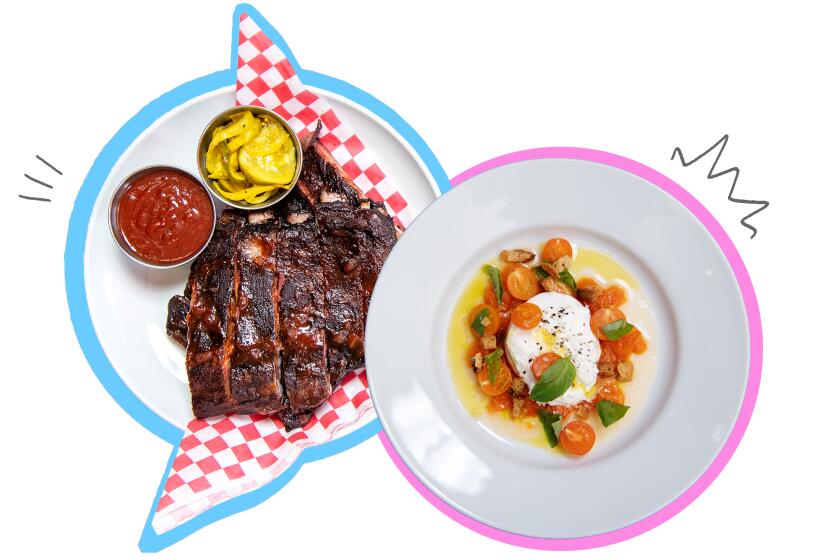A moment-by-moment look at an L.A. restaurant the day after the coronavirus shutdown

- Share via
At 10:08 on Monday morning, Caitlin and Daniel Cutler pulled their Jeep Cherokee into the parking lot of Ronan, their Melrose Avenue Italian restaurant. Their 7-month-old daughter McKenna sat smiling in a car seat in the back.
On any other Monday, their one day off a week, Caitlin, 35, and Daniel, 34, would just be getting out of bed, thinking about a trip to Coni’ Seafood in Inglewood for marlin tacos and shrimp aguachile. Instead, Caitlin stood outside clutching a piece of paper on which she’d scribbled a to-do list. On it were “rent,” “to-go staffing?” and “looting/riots.”
“We have to figure all that out today,” she said.
A little more than 12 hours earlier the restaurant was almost full; Ronan was hosting its twice-a-month retro Italian American night called Parmboyz. Revelry screeched to a halt around 8:30 when Mayor Eric Garcetti announced that all Los Angeles restaurants needed to close their dining rooms by midnight and keep them closed through March 31.
By the end of the evening, many of the staff were in tears, and the Cutlers attempted to form a game plan. The couple decided to open for a three-hour window on Monday. Delivery and takeout was a small part of Ronan’s business; now it would be the only way for the restaurant to make any money.
During mandated dine-in closures, these restaurants are offering takeout and delivery as the coronavirus pandemic keeps Los Angeles close to home.
The first thing on Caitlin’s to-do list was a meeting with the other tenants of the building: Mike Khorosh, 36, and Alexandra Dickison, 31, run a small coffee shop called Toasted and Roasted; Ashley Chung, 49, and Daniel Chung, 48, own Chantell, a clothing store that’s been in the building for 25 years. The night before Caitlin had been tasked with drafting a unified letter to the landlord to ask for guidance on what to do if and when they can’t afford to pay. Rent at Ronan is $8,500, and it’s due the first of the month.
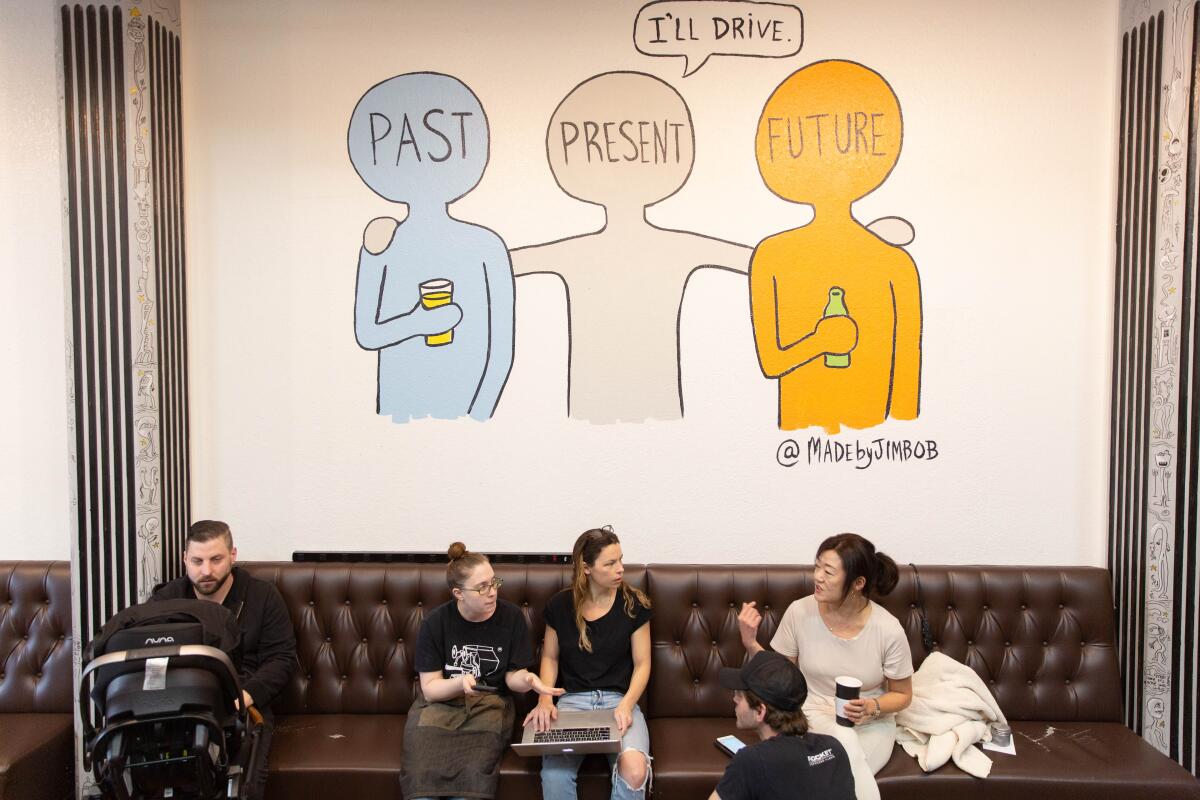
The small group sat quietly opposite the coffee counter at Toasted and Roasted. Daniel pushed McKenna around in a stroller, dodging the handful of customers who dropped in for their morning coffee.
“Let’s just get by and survive right now,” Caitlin said.
After everyone in the group approved the letter, fingers were crossed and the letter was sent.
The Cutlers left the coffee shop under a graying sky and headed east to Hail Mary, David Wilcox’s pizza restaurant in Atwater Village. Wilcox had organized a meeting of a half dozen restaurant owners and chefs to strategize and share information on the best ways to deal with the effects of the novel coronavirus outbreak.
“I’m just looking for some guidance on what to tell my employees,” Caitlin said. “I’m hoping someone there has talked to a lawyer already and we can group share our lawyer contacts.”
The Cutlers arrived at Hail Mary and took seats in the back. Chairs were set up in the dining room in a U shape; a table in the middle was stocked with individually packaged pastries, water and hand sanitizer. In attendance were Chad and Chase Valencia, the brothers who run Lasa in downtown L.A.; Sarah Bessade and Antoine Blandin, owners of Loupiotte in Los Feliz; Akira Akuto and Nick Montgomery of Echo Park’s Konbi; Kitchen Culture Recruiting founder Kristel Arabian; Roxana Jullapat from Friends and Family in Hollywood; and Na Young Ma, the chef-owner of Proof bakery in Atwater Village.
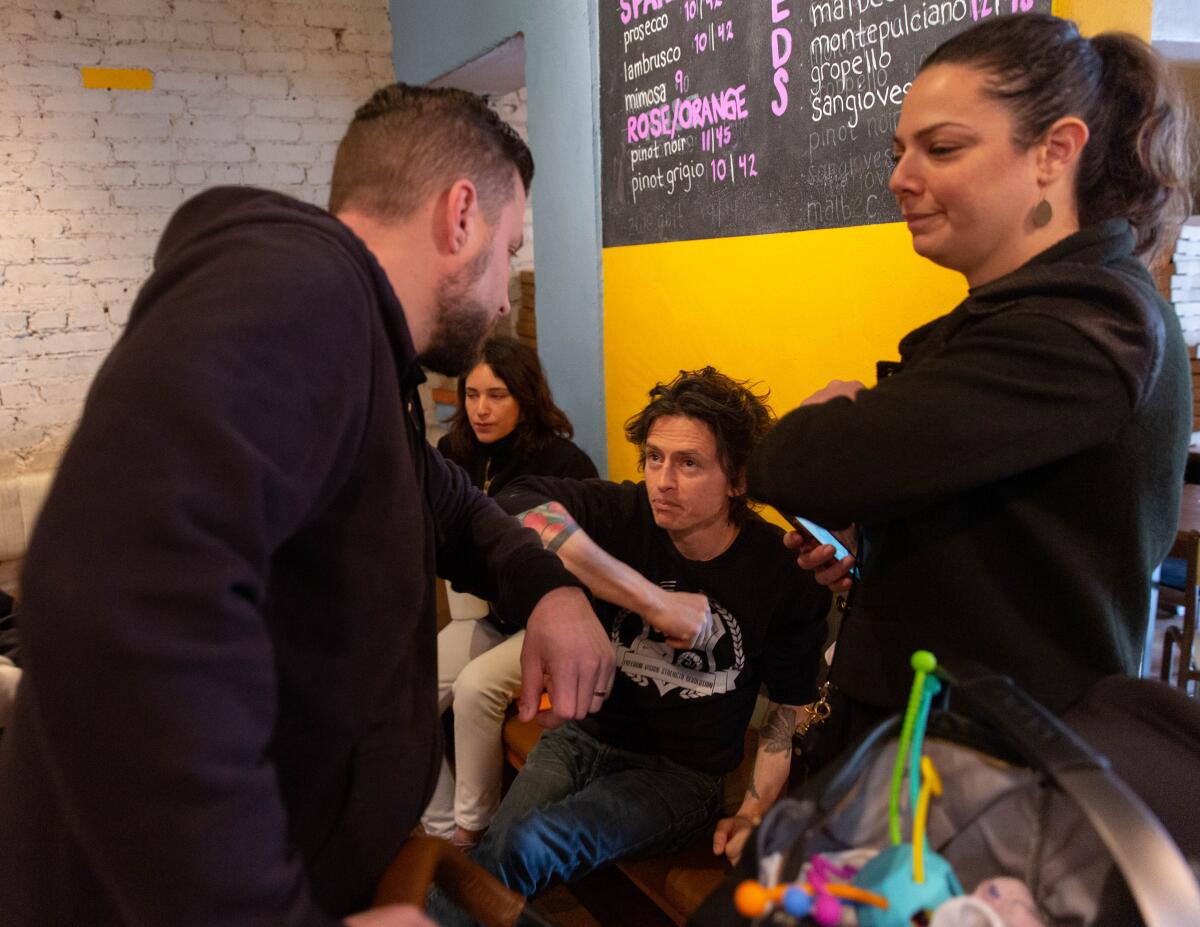
The group discussed rent abatement, the uselessness of loans, unemployment for their employees, the need for credit cards and delivery apps to waive their fees, and what they can do to keep their staff employed.
The group discussed rent abatement, the uselessness of loans, unemployment for their employees, the need for credit cards and delivery apps to waive their fees, and what they can do to keep their staff employed.
“What if we have our own employees deliver the food?” someone asked.
“You’ll need to check with your insurance,” Daniel said. “What if that person is delivering food for you and kills someone with their car?”
“What if we have our staff stay in the restaurant and we go out and deliver the food ourselves?” Arabian suggested.
“What are you guys doing about security?” Caitlin asked. “Are you doing anything to prevent break-ins?”
With questions mostly unanswered, the group ended the meeting with a plan for a Change.org petition to bring awareness to the needs of small businesses and the formation of the Los Angeles Hospitality Coalition, a group of restaurants that will work together to lobby for action and provide mutual support for one another.
Around 1 p.m., as it started to drizzle, Daniel dropped Caitlin off at Ronan and drove to the bank with McKenna to make a deposit.

Caitlin punched in the code to the back door of Ronan and stepped inside. Instead of turning on all the lights and removing chairs from the tops of tables as she usually would have, she turned on the kitchen lights and removed a few chairs at the bar to make a work space. She fired up her computer and gathered three tablets in front of her. The sleek black tablet was for Postmates, the black tablet wrapped in a heavy-duty case was for DoorDash and the white one was for Caviar.
She signed in and made adjustments to let the services know that the restaurant would be open that night.
“Resy is building a to-go platform, so I’m going to build that today as well,” she said. “We saw this thing that Grubhub had waived fees, so we will be receiving a tablet from them shortly, but we looked and [the fees are] actually higher. Most are around 20% and Grubhub is around 30%. So we need to figure out how to cancel it.”
She slid on her tortoiseshell glasses and furrowed her brow, then fired off emails to Postmates, Caviar and DoorDash, inquiring about reduced fees. Then she grabbed a server’s notepad and started to break down the restaurant’s financials.
“In our business account today we have $32,000,” she said. “I also have a bunch of bills to upload today to see our true liability and where we stand right now.”
After doing the math in her head, she estimated that Ronan has $7,600 in bills due this week and an additional $4,000 in bills due before the end of the month. At least another $4,000 will go to payroll and $12,000 is due in sales tax. Plus, she still has to pay out about $2,500 in tips.
‘There are four weekends in a month. One pays rent, one pays sales tax and the other two pay payroll. Weekdays go towards your daily bills.’
— Caitlin Cutler, co-owner of Ronan restaurant
“There are four weekends in a month. One pays rent, one pays sales tax and the other two pay payroll. Weekdays go towards your daily bills,” Caitlin said.
She paused her spiral into accounting hell and took a quick peek at her email. She got a notice that a faculty member at her daughter’s school has a family member who tested positive for coronavirus. She took her glasses off, let out a sigh, then kept reading. Her landlord responded. He agreed to look into options, a response Caitlin saw as a win.
Daniel returned and ran through the inventory available for the evening. Having prepped and shopped for a busy weekend that never reached its peak, Daniel was confident that he’d have enough food to sustain the three hours they’d be open that evening, but he wouldn’t have everything.
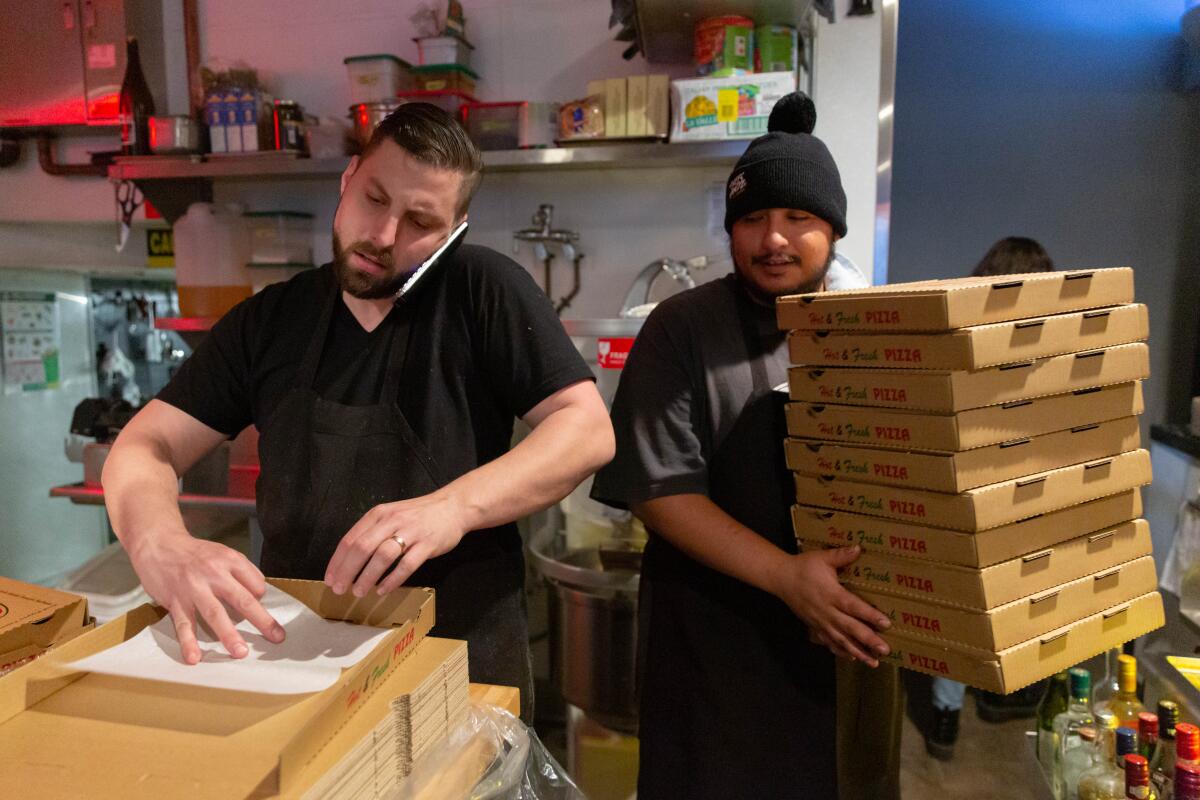
“We’re out of bread,” Daniel called to his wife as she updated the delivery menus on each of the tablets. “We have tiramisu. I think we have eggplant. We need to eighty-six clams. And cheesecake. We have sea bass, but we need to do a smaller portion.”
“For a lower price,” she called back.
At 2 p.m. Caitlin, with McKenna balanced on one hip, joined a Zoom call to speak with her accounting firm and some other local business owners. As Daniel wrapped dishware in plastic wrap to store until the restaurant reopens, the accountants advocated for requesting reduced delivery fees and rent abatement and suggested using checks to pay out employees to avoid payroll taxes. They also suggested Caitlin call utility companies and vendors to ask for extensions.
Caitlin asked if she could use her employees as delivery drivers. The answer was no.
When the call ended, there was silence in the room as the reality of the situation settled in a little deeper.
“Well, I’m definitely more stressed after that call,” Caitlin said with a nervous laugh.
Just after 3 p.m., two cooks, Jesse Soto, 28, and Isaac Fordham Jr., 38, walked through the back door. They put on aprons and surveyed the kitchen; they spent the next two hours slicing and dicing ingredients and folding pizza boxes.
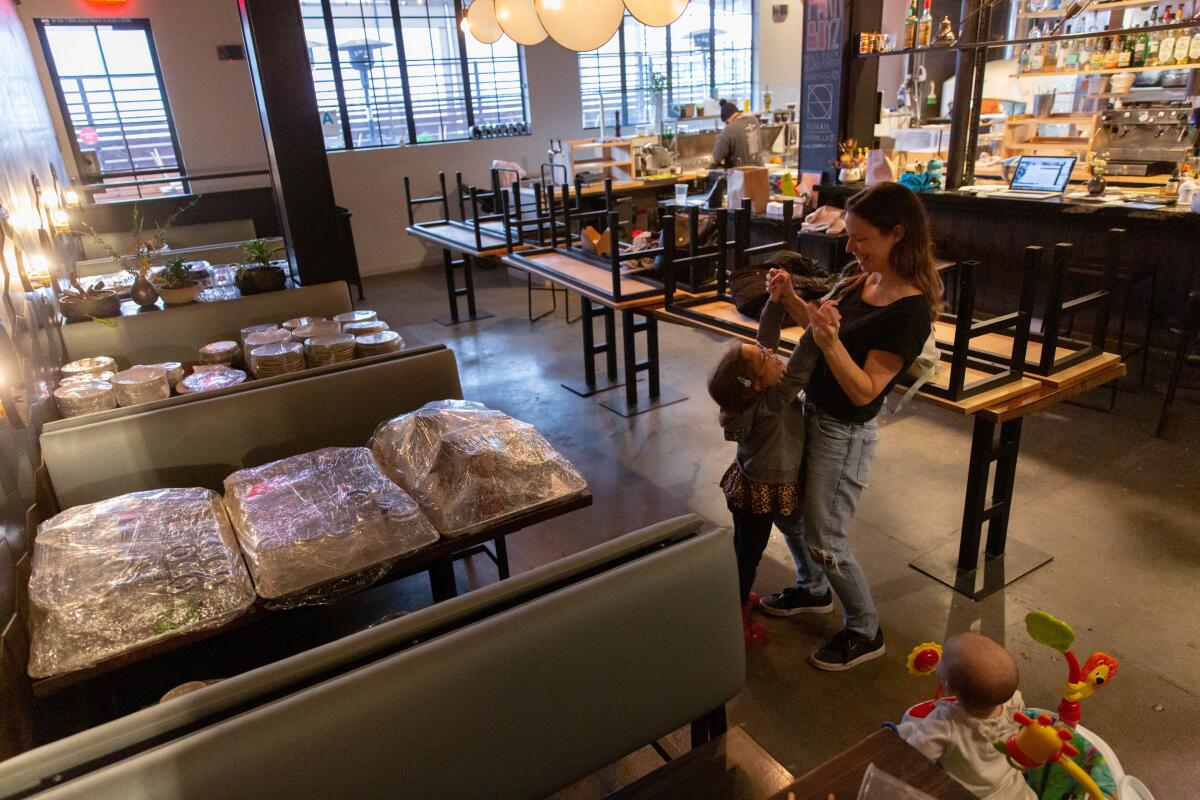
Caitlin sat in front of her computer and composed an email to the restaurant’s mailing list, made a plan to post something on Instagram later in the day and decided on a gift card promotion: $60 cards would be $50; $125 cards would be $100. She emailed her vendors to ask for extensions.
The wind howled outside and the tarp covering the patio shook violently. Rain started to pour.
Just after 3:30 p.m., Logan, their 4-year-old daughter, bounced into the room holding Caitlin’s mother’s hand. In addition to having the business model turned on its head the night before, the cancellation of school in L.A. meant the Cutlers were now responsible for the full-time care of their two children.
Caitlin checked her email again. None of the delivery apps had responded and all the vendors refused to change their terms.
A little after 5, two front-of-house employees, Brian O’Farrell, 33, and Jessica Morris, 26, arrived.
Caitlin gathered the four employees for a meeting; they stood in a semicircle at the bar, arms folded across their chests.
“We’re trying to ride out the momentum, but we don’t know how this is going to go,” she said. “The tip pool will be evenly distributed. Daniel and I decided this was the most fair going forward.”
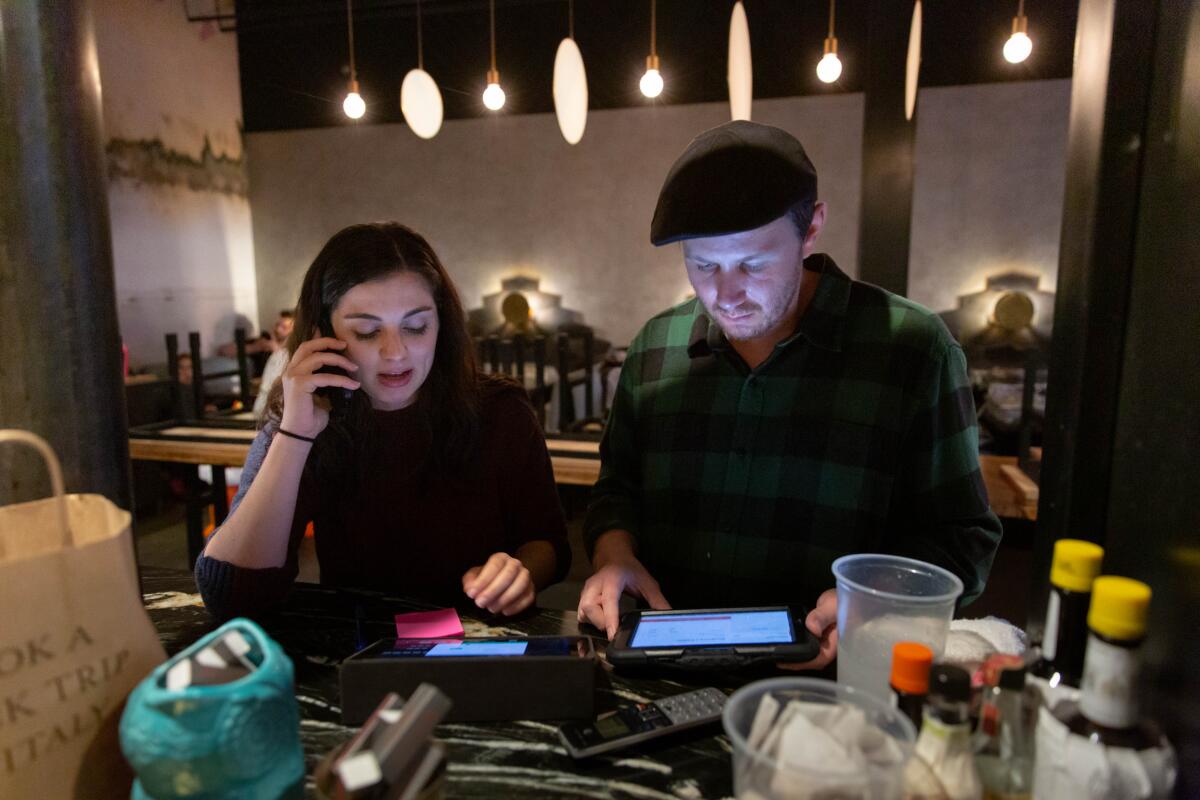
The announcement was met with measured enthusiasm. O’Farrell and Morris cleared out the liquor shelves and wiped down counters while Soto and Fordham worked with their heads down in the kitchen.
There was a lull as everyone waited for the first order to come in.
“The tablets make this dinging noise and I’m usually thinking, “Shut up!” Caitlin said.
Daniel stacked pizza boxes while Morris called customers with reservations to make sure they knew they couldn’t dine in. With no music playing and the only ambient sound provided by the kitchen vents, the tension in the room was palpable. By now it was dark, and rain pounded the windows.
“I never really thought about what the last day of this restaurant would look like,” Caitlin said. “How we would take it apart and move out.”
At 6:27 p.m. the DoorDash tablet fired off a loud “bring, bring.”
Everyone stopped what they were doing and listened.
“Fire calzone,” Caitlin yelled.
“Yea, yea we got an order,” bellowed Fordham with a clap. “McKenna we got a calzone, baby!”
And in that moment the energy shifted from one of despair to elation. The order ticket machine hissed and Daniel got to work, rolling out dough.
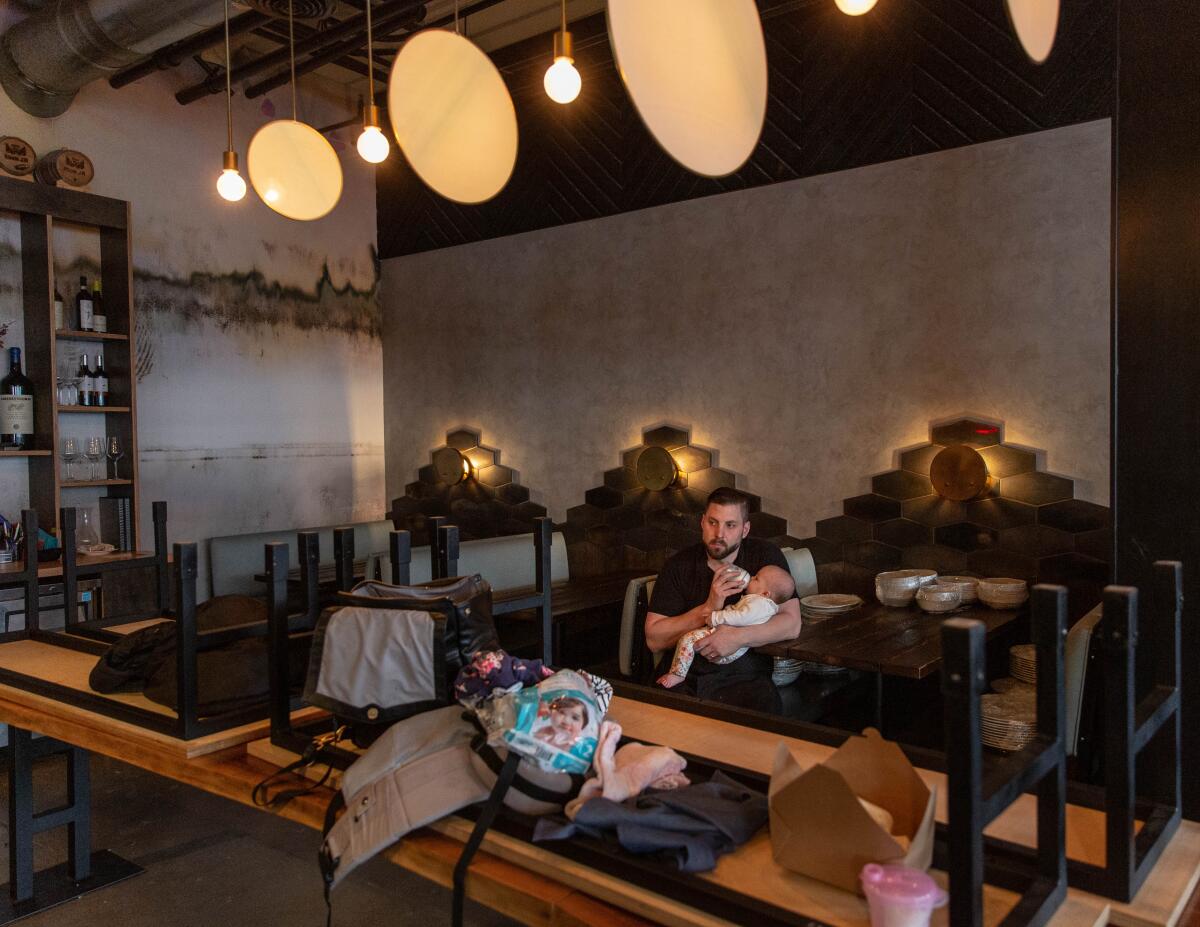
Five minutes later there was another order: broccolini, Caesar salad and three pizzas. Then another: two calzones. And another: margherita and a Sweet Cheeks pizza.
“I’m still feeling nervous,” Caitlin said. She was interrupted by a loud “ding ding” from the Postmates tablet. “My fear is that this is not only going to be two weeks. I appreciate the support of people responding to us on Instagram, but how many times can our regulars order to-go from us?”
As she gathered her things to leave for the night and put the kids to bed, the excitement of the moment faded and she mentally ran through the next day’s tasks: double check that the website is up-to-date; figure out what to do about their 22 employees; decide whether they should expand the menu; talk to the landlord; email the accountants about a tax relief plan; write up a business proposal for a small business loan; worry about their own rent.
“We’ll take things as they come,” she said. The Postmates tablet chimed again. “Oh, that’s two orders!”
7315 Melrose Ave., Los Angeles, (323) 917-5100, ronanla.com
More to Read
Eat your way across L.A.
Get our weekly Tasting Notes newsletter for reviews, news and more.
You may occasionally receive promotional content from the Los Angeles Times.
